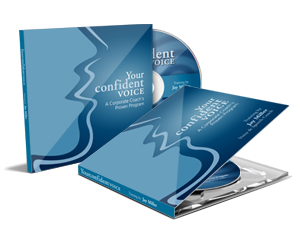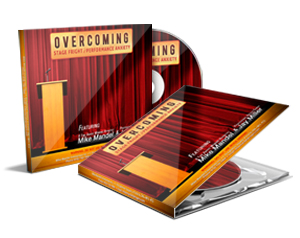CHOOSING YOUR TASK
Know What You're Practicing
Have you ever finished a speech or a presentation and realized you couldn’t really remember what happened? You know you got through it, but in retrospect, the whole experience seemed like a blur? Or have you walked away from the podium feeling needy, desperate for someone to tell you that you did a good job? It’s not a very good feeling, is it?
Here’s a strategy that will help you avoid those post-presentation blues and walk away from your performance feeling clear, strong and in charge of your process. It’s called “Choosing Your Task.”
If you’re like many speakers, you probably approach the front of the room with no clear strategy or technique. You’ve got a vague mental checklist of 50 things you need to do right: stand up straight, project your voice, make eye contact, gesture, etc., etc., etc. It’s more than any human being can keep track of, but you’ve got your fingers crossed, hoping for the best.
You need to choose a task. Spend time considering this question: What is one thing I could do that would make this presentation better than the one before? You might decide, “My task is to feel both feet on the ground,” or, “My task is to pause and breathe deeply after every sentence.” Your task might be to engage your whole voice, or to make a personal connection with three listeners. There are dozens—hundreds—of things you could identify as your personal task. It can be anything, as long as it’s specific, actionable, realistic and relevant for you.
Focusing on a particular task keeps you present. You’re less likely to get lost in your thoughts or swept away by the energy of the performance, so you’ll actually remember what happened when you finish. You’ll have a clearer sense of how it turned out, because the personal task has a way of keeping you anchored in the moment.
The personal task keeps you objective. Without a task, you have no specific sense of your performance, and you become more reliant on others for feedback. They may or may not know what they’re talking about. When you focus on one task, you’re able to evaluate yourself with more clarity. It’s an easy matter to ask yourself, “How did I do with [fill in the blank]?” You put yourself in control of your own assessment, and believe me, that feels a whole lot better than hoping someone else will tell you that you did a good job.
Choosing your task keeps you realistic. If you’ve been delivering mediocre presentations, and approach the next one hoping it will be great, you’re setting yourself up for failure. That’s not the way improvement happens. Improvement is incremental. By choosing a specific task, one that’s within your reach, you set yourself up for success. It feels good to walk away from a speech knowing it was better than the one before.
Finally, the personal task ensures you keep improving. If your strategy is to cross your fingers and hope you give a great speech, you could be wandering around in the dark for a very long time. But if you practice one specific skill every time you get up to speak, I guarantee you will get better. It’s just a matter of time and experience. So always take a few minutes to choose your task. It will make a noticeable difference in your performance.
 The Sound of Success
The Sound of SuccessEnroll in this FREE video mini course and discover a powerfully attractive voice.
 Your Confident Voice
Your Confident VoiceThis 145-minute mp3 download is a complete speaking voice course. The simple but amazingly effective program is on sale this month!
 Overcoming Stage Fright
and
Overcoming Stage Fright
andPerformance Anxiety
On this mp3 download, Jay Miller teams up with six-time award-winning hypnotist Dr. Mike Mandel to deliver the most comprehensive program available for reducing or eliminating stage fright.